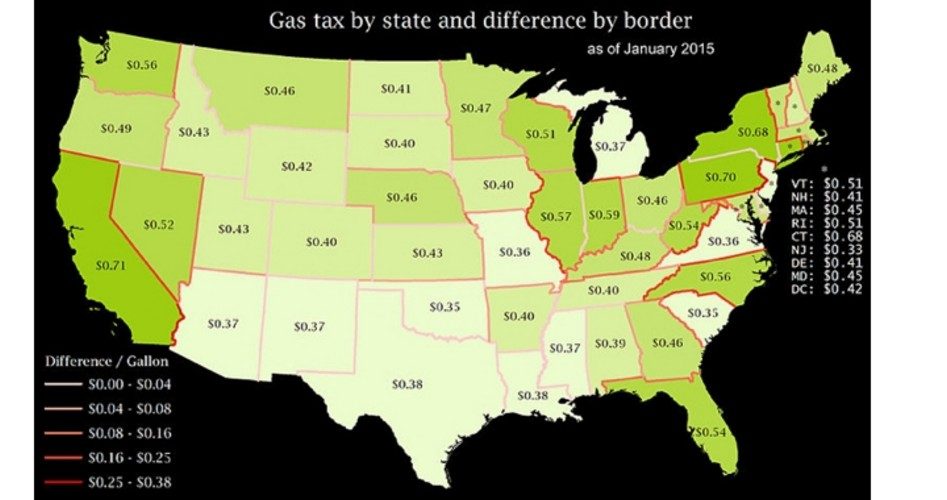
The White House announced Thursday that the president would be asking Congress to raise taxes on imported oil by $10 a barrel to be used to fund what the Wall Street Journal describes as “new green transportation projects.” The new taxes to be levied on oil companies will be passed down to motorists who will enjoy the opportunity to help the president fund those new projects by 22 cents per gallon every time they fill up.
The danger isn’t that the president’s bill has any chance in the Republican-controlled Congress, this being an election year and all. What is dangerous is that states might get the same idea: hit their citizens with tax increases at a time when they won’t be felt as much. After all, gas prices have fallen from nearly $4 a gallon a couple of years ago to under $2 a gallon now. Who would notice? Who would care?
According to Dave Schwartz and Justin Stevens, state directors for Americans for Prosperity in South Carolina and Indiana respectively, it’s already happening. Drivers in South Carolina pay 16.75 cents per gallon in state taxes plus the mandatory 18.4 cents per gallon to support the federal Highway Trust Fund, for a total of 35.15 cents per gallon. In her 2013 State of the State speech, South Carolina’s Governor Nikki Haley was adamant: “I will not — not now, not ever — support raising the gas tax. The answer to our infrastructure problems is not to tax our people more; it’s to spend their money smarter.”
That was then. In January 2014, she had a change of heart and proposed a gas-tax increase of 10 cents a gallon. She tied it to a two-percent cut in the top income tax bracket (over 10 years), and it was passed by the state House but died in the Senate. Last month she tried again. The bill is pending.
Indiana motorists pay 29.89 cents per gallon in state taxes (plus the 18.4 cents in federal tax), which total nearly 50 cents per gallon. But there’s room for more, according to Republicans in the state House which just passed a gas-tax increase of four cents per gallon, which would push Indiana into the highest third of all states in gas taxes. To add insult to that injury, the House would index the state’s gas taxes to inflation, resulting in perpetual tax increases without having to bother the state’s politicians in the future.
To his credit, Indiana Governor Mike Pence doesn’t like the idea, especially since the state has a $2 billion budget reserve. Said Pence: “When you have money in the bank and the best credit rating in America, the last place you should look to pay for roads and bridges is the wallets and pocketbooks of hard-working Hoosiers.”
But momentum behind the gas bill, which is being coupled with a sin tax of $1 on cigarettes, may be enough to override any veto that Pence might wield.
No matter how persuasive the arguments are for a raise in the gas tax, this is hardly the time to consider it. The arguments for raising the tax go like this:
• There’s been no increase in the federal gas tax since 1993;
• Gas taxes haven’t kept up with inflation;
• Roads and bridges are in poor condition, costing motorists and truckers unnecessary repairs;
• If taxes aren’t raised, jobs to repair and maintain those roads and bridges won’t be created.
The case against raising the gas tax is elegant and persuasive: The middle class can’t afford it. According to the Census Bureau and the Bureau of Labor Statistics, median household income has fallen by $1,268 between 2009 and 2014 while consumers’ prices have increased by 11 percent.
A better solution, and one that lines up with the U.S. Constitution and its enumerated powers under Article I Section 8, is to abolish the Federal Highway Trust fund altogether (along with the 18.4 cent federal tax), and let the states, rightly or wrongly, decide how to solve the problem. The states could consider user fees, or season passes (like those offered by ski resorts) for frequent users, or letting private contractors manage, maintain and upgrade the roads using funds collected from electronic toll booths (though watching out for the dangers of public-private partnerships). Raising taxes should be the last tool to be considered, not the first or the only one.
In a world where the federal government operates under its constitutional constraints, there would be additional savings as well. Every year since 2008, taxpayers have been forced to fork over billions in additional funds just to keep the Highway Trust Fund solvent. In addition, only 60 percent of that trust’s funds extracted from motorists are even spent on highways! The balance is spent on promoting mass transit dreams and repairing leaky underground storage tanks.
If common sense and constitutional constraints are allowed to rule the day, the country’s roads, highways, and bridges would be in better shape and at much lower cost. The Founders are right: Government works best when it is limited, and closest to those paying for it.
Image: ElVacilando
A graduate of an Ivy League school and a former investment advisor, Bob is a regular contributor to The New American magazine and blogs frequently at LightFromTheRight.com, primarily on economics and politics. He can be reached at [email protected].
Related article:



